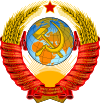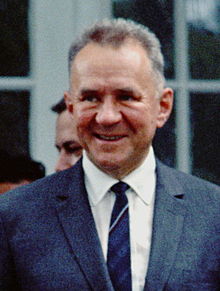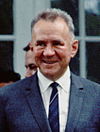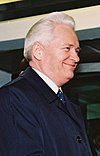Premier of the Soviet Union
It has been suggested that this article be merged with Chairman of the Council of Ministers of the Soviet Union. (Discuss) Proposed since October 2023. |
| Premier of the Soviet Union | |
|---|---|
| Глава Правительства СССР (Russian) | |
 | |
| Style | Mr. Premier (informal) His Excellency (diplomatic) |
| Type | Head of government |
| Reports to | Supreme Soviet |
| Residence | Kremlin Senate, Moscow |
| Appointer | Supreme Soviet |
| Formation | 6 July 1923 |
| First holder | Vladimir Lenin |
| Final holder | Ivan Silayev |
| Abolished | 26 December 1991 |
| Succession | Prime Minister of Russia |
| Deputy | First Deputy Premier
Deputy Premier |
The Premier of the Soviet Union (
Union of Soviet Socialist Republics (USSR). Twelve individuals held the post. Among the most known are Vladimir Lenin and Joseph Stalin
.
Names
The office had four different names throughout its existence: Chairman of the Council of People's Commissars (1923–1946), Chairman of the Council of Ministers (1946–1991), Prime Minister (January – August 1991) and Chairman of the Committee on the Operational Management of the Soviet Economy (August–December 1991). Long before 1991, most non-Soviet sources referred to the post as "Premier" or "Prime Minister."
History
Committee on the Operational Management of the Soviet Economy. The government of the Russian Soviet Federative Socialist Republic began seizing Soviet ministries in the aftermath of the coup, and by December 1991 the Soviet government had completely lost control of itself and shut down entirely.[3]
Under the
1977 Soviet Constitution, the head of government was the leader of the highest executive and administrative organ of state. The head of government was appointed by and accountable to the Supreme Soviet (and its Presidium).[4] The head of government was tasked with resolving all state administrative duties within the jurisdiction of the USSR to the degree which were not the responsibility of the Supreme Soviet or its Presidium. The head of government managed the national economy, formulated the five-year plans and ensured socio-cultural development.[5] It functioned as the most influential office of government until the establishment of the Office of the President of the Soviet Union
in 1990.
Vladimir Lenin and Joseph Stalin died in office of natural causes, and three premiers resigned—
party leader and head of government (Lenin, Stalin and Nikita Khrushchev). The one who spent the shortest time in office was Ivan Silayev
, at 119 days. Kosygin spent the longest time in office—16 years.
List of officeholders
| No.[a] | Portrait | Name (Birth–death) |
Term | Electorate | Cabinets | Ref. | ||
|---|---|---|---|---|---|---|---|---|
| Took office | Left office | Duration | ||||||
| 1 | [6] | |||||||
| 2 | [7] | |||||||
| 3 | Vyacheslav Molotov (1890–1986) | 19 December 1930 | 6 May 1941 | 10 years, 138 days | 1931 1935 1936 1937 | Molotov I–II–III–IV | [8] | |
| 4 | [9] | |||||||
| 5 | [10] | |||||||
| 6 | [11] | |||||||
| 7 | Nikita Khrushchev (1894–1971) | 27 March 1958 | 15 October 1964 | 6 years, 202 days | 1962 | Khrushchev I–II | [10] | |
| 8 | Alexei Kosygin (1904–1980) | 15 October 1964 | 23 October 1980 | 16 years, 8 days | 1966 1970 1974 1979 | Kosygin I–II–III–IV–V | [12] | |
| 9 | Nikolai Tikhonov (1905–1997) | 23 October 1980 | 27 September 1985 | 4 years, 339 days | 1984 | Tikhonov I–II | [13] | |
| 10 | Nikolai Ryzhkov (1929–2024) | 27 September 1985 | 14 January 1991 | 5 years, 109 days | 1989 | Ryzhkov I–II | [13] | |
| 11 | Valentin Pavlov (1937–2003) | 14 January 1991 | 28 August 1991[b] | 226 days | – | Pavlov | [14] | |
| 12 | Ivan Silayev (1930–2023) | 28 August 1991 | 25 December 1991 | 119 days | – | Silayev | [15] | |
See also
| Politics of the Soviet Union |
|---|
 |
|
|
- Bibliography of the Russian Revolution and Civil War § Government
- Bibliography of Stalinism and the Soviet Union § Government
- Bibliography of the Post Stalinist Soviet Union § Government
- Deputy Premier of the Soviet Union
- First Deputy Premier of the Soviet Union
- List of heads of state of the Soviet Union
- List of leaders of the Soviet Union
Notes
- ^ These numbers are not official.
- ^ On August 19, 1991, due to the illness of Valentin Pavlov, the duties of the head of the government of the USSR were assigned to First Deputy Prime Minister Vitaly Doguzhiyev.
References
Citations
- ^ Центральный Исполнительный Комитет съезда Советов. Статья №38 от Декабрь 1977 «Суверенные права союзных республик». (Central Executive Committee of the Congress of Soviets. Article #38 of December 1924 Sovereign Rights of the Member Republics. ).
- ^ Brown 2009, p. 403.
- ^ Ferdinand 1993, p. 133.
- ^ Верховный Совет СССР. Федеральный конституционный закон №130 от 7 октября 1977 «Совета Министров СССР». (Supreme Soviet of the Soviet Union. Article #130 of 7 October 1977 The Council of Ministers of the USSR. ).
- ^ Верховный Совет СССР. Федеральный конституционный закон №131 от 7 октября 1977 «Совета Министров СССР». (Supreme Soviet of the Soviet Union. Article #131 of 7 October 1977 The Council of Ministers of the USSR. ).
- ^ Cull, Culbert & Welch 2003, p. 182.
- ^ Phillips 2000, p. 82.
- ^ Phillips 2000, p. 89.
- ^ Totten & Bartrop 2008, p. 76.
- ^ a b Duiker & Spielvogel 2006, p. 572.
- ^ Trahair & Miller 2004, p. 69.
- ^ Trahair & Miller 2004, p. 37.
- ^ a b Ploss 2010, p. 219.
- ^ Валентин Сергеевич Павлов [Valentin Sergeyevich Pavlov] (in Russian). RU: Hrono. Retrieved 6 December 2010.
- ^ Иван Степанович Силаев [Ivan Stepanovich Silayev] (in Russian). RU: Hrono. Retrieved 6 December 2010.
Sources
- ISBN 978-0061138799.
- Bonnell, Victoria; Cooper, Ann (1994). Russia at the Barricades: Eyewitness Accounts of the August 1991 coup. ISBN 978-1563242717.
- Coppa, Frank (2006). Encyclopedia of Modern Dictators: From Napoleon to the Present. ISBN 978-0820450100.
- Cull, Nicholas; Culbert, David; Welch, David (2003). Propaganda and Mass Persuasion: A Historical Encyclopedia, 1500 to the Present. ISBN 978-1576078204.
- Duiker, William; Spielvogel, Jackson (2006). The Essential World History. ISBN 978-0495902270.
- Dyker, David (1992). Restructuring the Soviet economy (1st ed.). ISBN 978-0415067614.
- ISBN 978-0674410305.
- Ferdinand, Maria Feldbrugge Joseph (1993). Russian Law: The End of the Soviet System and the Role of Law (1st ed.). ISBN 978-0792323587.
- Garcelon, Marc (2005). Revolutionary Passage: From Soviet to Post-Soviet Russia, 1985–2000. ISBN 978-1592133628.
- Harris, Jonathan (2005). Subverting the System: Gorbachev's Reform of the Party's Apparat, 1986–1991. ISBN 978-0742526792.
- Kotz, David Michael; Weir, Fred (2007). Russia's Path from Gorbachev to Putin: The Demise of the Soviet System and the New Russia (2nd ed.). ISBN 978-0415701471.
- Phillips, Steven (2000). Lenin and the Russian Revolution. ISBN 978-0-435-32719-4.
- Ploss, Sidney (2010). The Roots of Perestroika: The Soviet Breakdown in Historical Context. ISBN 978-0786444861.
- ISBN 978-1576070840.
- ISBN 978-1400042302.
- ISBN 978-0674008281.
- ISBN 978-0674034938.
- ISBN 978-0674016972.
- Totten, Samuel; Bartrop, Paul (2008). Dictionary of Genocide: A–L. Vol. 1. ISBN 978-0313346422.
- Trahair, Richard; Miller, Robert (2004). Encyclopedia of Cold War Espionage, Spies, and Secret Operations. ISBN 978-1929631759.
- Young, Gregory; Braden, Nate (2005). The Last Sentry: The True Story That Inspired the Hunt for Red October. ISBN 978-1591149927.
- Zemtsov, Ilya (1989). Chernenko, the Last Bolshevik: The Soviet Union on the eve of Perestroika. ISBN 978-0887382604.








